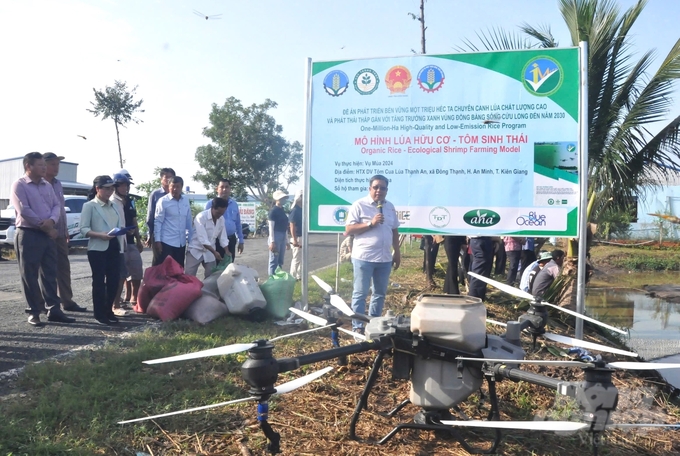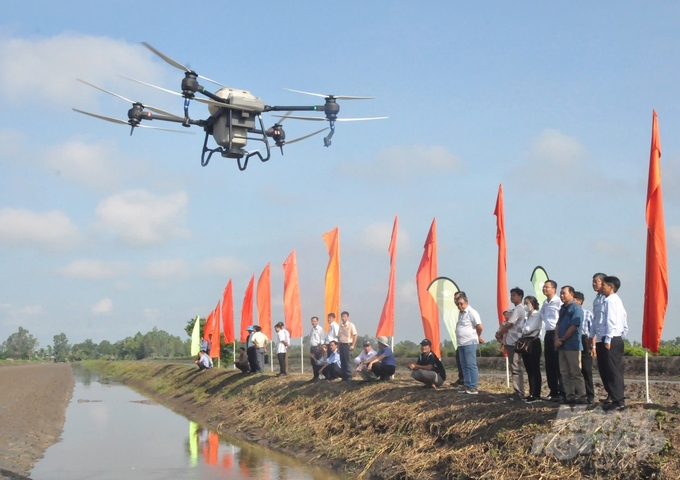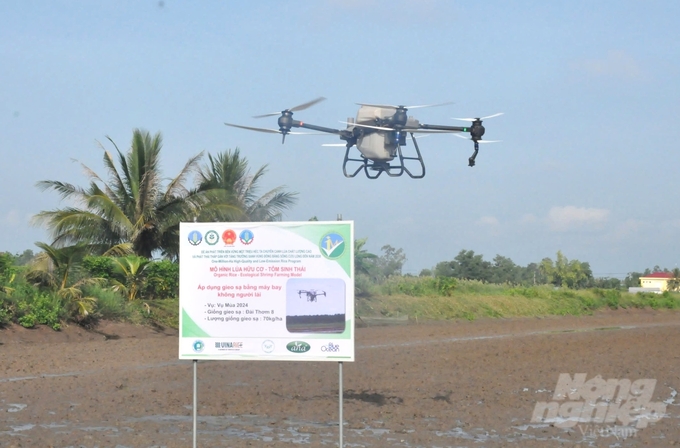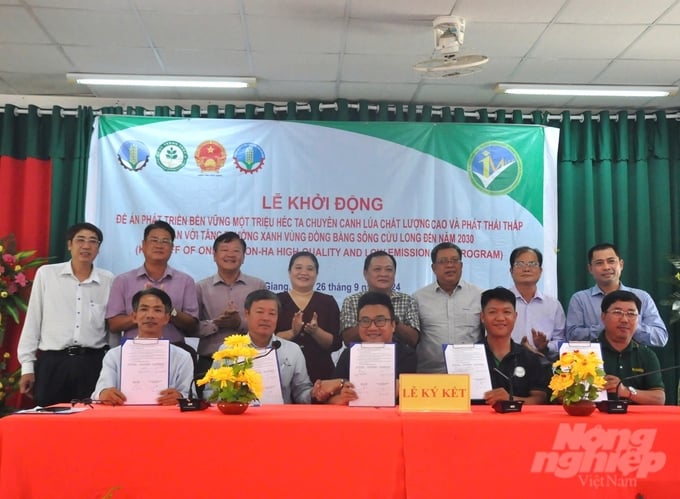May 21, 2025 | 13:35 GMT +7
May 21, 2025 | 13:35 GMT +7
Hotline: 0913.378.918
May 21, 2025 | 13:35 GMT +7
Hotline: 0913.378.918
On September 26, the Department of Crop Production (MARD) in coordination with Kien Giang Province’s Department of Agriculture and Rural Development, launched the "Sustainable Development of 1 Million Hectares of High-Quality, Low-Emission Rice Cultivation Linked to Green Growth in the Mekong Delta by 2030" project (1MH Project). The launch took place in the rice-shrimp farming areas of An Minh District.

Mr. Le Thanh Tung, Deputy Director of the Department of Crop Production, introduced the goals of the 1 million hectare high-quality rice project and discussed methods for reducing emissions in rice cultivation. Photo: Trung Chanh.
The pilot “Organic Rice - Ecological Shrimp” model was implemented at the Thanh An Shrimp-Crab-Rice Cooperative (Dong Thanh Commune, An Minh District) across 10 hectares, with 13 participating households. At the pilot site, delegates observed demonstrations of advanced technology in rice production, including the use of drones, which help reduce seed usage and labor costs.
Mr. Nguyen Van Khanh, Director of the Thanh An Shrimp-Crab-Rice Cooperative, expressed his honor at being chosen as the first cooperative in An Minh District to participate in the 1MH Project, with the pilot model launching in the 2024 - 2025 crop season.
This is seen as a crucial first step for cooperatives and farmers in adopting the rice-shrimp model, which aims to promote sustainable agricultural practices and green growth. The pilot model introduces several innovations, including changes in farming techniques, reduced investment costs through lower seed usage, decreased input materials, and reduced emissions during production.

Field demonstration of the application of advanced technology in rice production using drones, reducing the amount of seeds sown and reducing labor costs on the pilot field of "Organic Rice - Ecological Shrimp". Photo: Trung Chanh.
Mr. Nguyen Hoang Khai, Vice Chairman of the An Minh District People’s Committee, noted that An Minh has the largest rice-shrimp production area in Kien Giang province. By participating in this Project, An Minh District will contribute 20,000 hectares of rice-shrimp rotational farming, adding to the 200,000 hectares Kien Giang province has committed to the initiative.
From this pilot field, district agricultural units will train farmers to properly implement the high-quality rice production techniques issued by the Department of Crop Production. The district aims to reorganize production in its rice-shrimp areas, expanding “Organic Rice - Ecological Shrimp” fields. By 2030, the goal is for four communes in the district to participate in the 1MH Project, involving around 7,000 farming households, covering a minimum of 20,000 hectares of rice-shrimp fields per crop, as initially registered.
According to Mr. Nguyen Van Nghia, Deputy Director of the Kien Giang Department of Agriculture and Rural Development, rice production is one of the province's key strengths, with an annual output of over 4 million tons, playing a crucial role in socio-economic development. By 2030, Kien Giang's rice cultivation area is expected to reach 375,000 hectares, with a total production area exceeding 700,000 hectares per year. Currently, the rice-shrimp production model spans 106,000 hectares, concentrated in districts such as An Bien, An Minh, U Minh Thuong, and Vinh Thuan. This model will continue to expand in the future.

The pilot production model of “Organic Rice – Ecological Shrimp” applies new technical advances and technologies to production. Photo: Trung Chanh.
The pilot “Organic Rice - Ecological Shrimp” production model, which applies new technical advances and technologies, was launched in An Minh District as the second field in Kien Giang province to join the 1MH Project. This innovative model, piloted as part of the Project, focuses on integrating technical improvements and modern technologies into the production process. It aims to help rice farmers proactively adapt to climate change, reduce greenhouse gas emissions, increase their income, and contribute to green growth in the agricultural sector.
Building on the initial success of the fields in An Minh and Tan Hiep, Kien Giang’s Department of Agriculture and Rural Development plans to expand the Project to the remaining 10 districts in 2024 and beyond. The goal is to reach 60,000 hectares by 2025, and 200,000 hectares by 2030, as committed to the MARD.

Representatives of various enterprises and the Thanh An Shrimp and Crab Service Cooperative signed a cooperation agreement to develop a sustainable rice value chain based on the “Organic Rice - Ecological Shrimp” model. Photo: Trung Chanh.
Mr. Le Thanh Tung, Deputy Director of the Department of Crop Production, emphasized that the pilot “Organic Rice - Ecological Shrimp” field in An Minh district is the seventh model to be introduced as part of the 1MH Project. What makes this pilot unique is its focus on a rice-shrimp rotation area, whereas earlier models were implemented in rice-specialized zones.
According to Mr. Tung, the Mekong Delta boasts a vast rice-shrimp farming area of over 200,000 hectares, with farmers in coastal provinces having practiced this method for more than 20 years.
However, the escalating effects of climate change have created increasing challenges for rice production, and without adaptation, these challenges will only intensify. At the same time, market demands for higher standards are growing, compelling farmers to transform their production methods.
Joining the Project paves the way for sustainable development, creating high-quality, low-emission rice fields aligned with green growth goals.
At the launch event, representatives from AHA Agrochemical Joint Stock Company, Dai Duong Xanh Import-Export Company Limited, Vietnam Rice Company Limited (Vinarice), Truong Thinh Technical Trading Company Limited, and the Thanh An Rice Shrimp and Crab Service Cooperative signed a cooperation agreement. This agreement aims to establish a sustainable rice value chain, following the “Organic Rice - Ecological Shrimp” model.
Translated by Quynh Chi

(VAN) In 2024, over 295 million people across 53 countries and territories faced acute hunger—an increase of almost 14 million people compared to 2023, while the number of people facing catastrophic levels of hunger reached a record high.

(VAN) World Environment Day 2025 (June 5) carries the theme 'Beat Plastic Pollution' continuing to emphasize the global urgency of addressing the plastic waste crisis.

(VAN) This was the assessment shared by experts at the workshop titled 'Assessing the Role and Potential of Low-Emission Rice Production Systems in Vietnam,' held on the morning of May 19.

(VAN) Cai Rong Port is the fisheries control center of Quang Ninh, helping to monitor fishing vessels, combat IUU fishing, and remove the EC's 'yellow card'.

(VAN) The German Agricultural Society (DLG) explores the possibility of establishing a mechanization service center in Vietnam’s Mekong Delta to support farmers in accessing and utilizing advanced machinery.

(VAN) On May 16, the Department of Water Resources Management, in collaboration with the Food and Agriculture Organization of the United Nations (FAO), held a signing ceremony for the GEF-8 project document.

(VAN) Food safety, mechanization, vocational training, and market opening are key areas of cooperation expected between the Vietnamese Government and the Federal Republic of Germany.